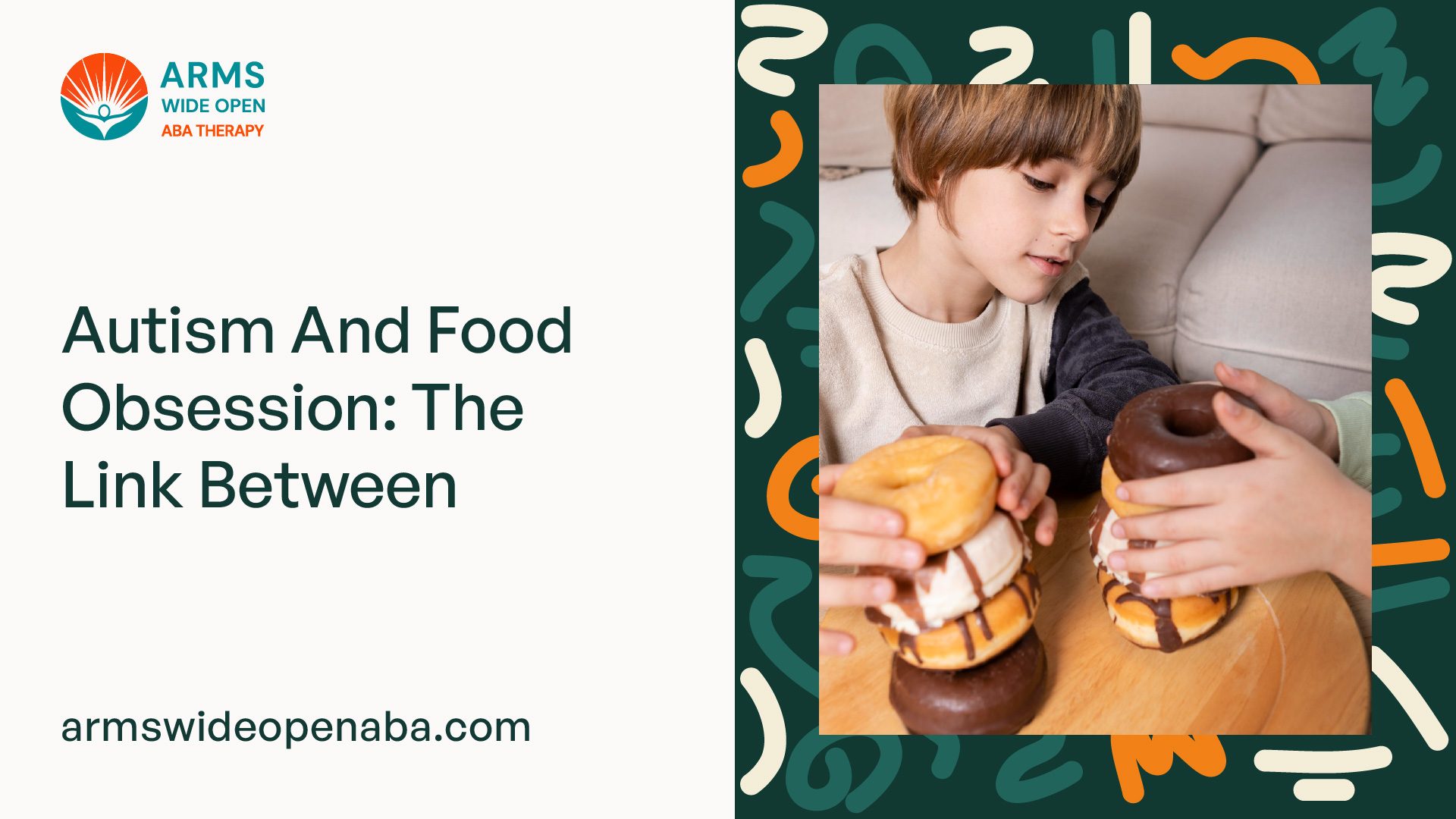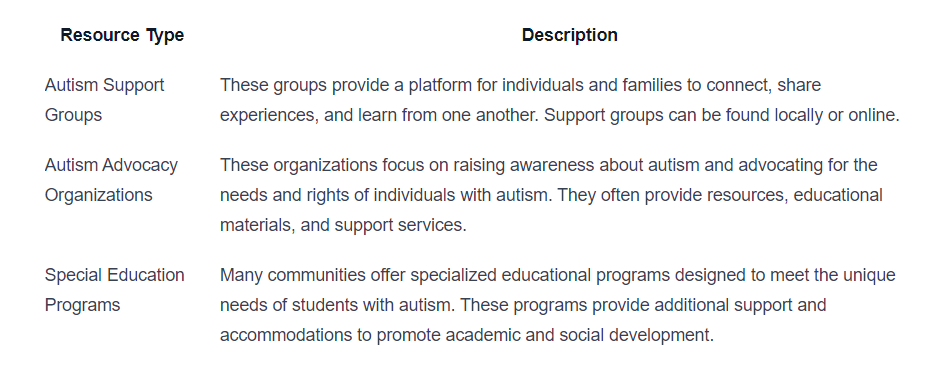Autism And Food Obsession: The Link Between
Discover the link between autism and food obsession. Learn strategies to manage and support individuals with autism.

Understanding Autism and Food Obsession
To comprehend the connection between autism and food obsession, it's crucial to have a clear understanding of autism spectrum disorder (ASD) and how food obsession manifests within this context.

Overview of Autism Spectrum Disorder
Autism spectrum disorder is a neurodevelopmental condition that affects individuals' social communication and behavior. It is characterized by a wide range of symptoms and challenges, which can vary from person to person. Some common characteristics of ASD include difficulties with social interaction, repetitive behaviors, and sensory sensitivities.
ASD is considered a spectrum disorder because the severity and combination of symptoms can differ significantly among individuals. Some individuals with autism may have intellectual disabilities, while others may have exceptional cognitive abilities in specific areas.
What is Food Obsession in the Context of Autism
Food obsession, also known as food selectivity or restrictive eating, refers to an intense preoccupation with certain foods or a limited range of food choices. This obsession can manifest in various ways, such as a strong preference for specific textures, colors, or brands of food. Individuals with autism may also exhibit rigid eating patterns and resistance to trying new foods.
Food obsession in the context of autism is often linked to sensory sensitivities and the need for sameness and predictability. For individuals with ASD, food may serve as a source of comfort and familiarity in a world that can be overwhelming. It can provide a sense of control and security amidst the challenges they face.
It's important to note that food obsession in autism is different from typical picky eating or food preferences. The intensity and rigidity associated with food obsession can have a significant impact on the individual's daily life, including their physical health, social interactions, and overall well-being.
Understanding the complexities of autism and food obsession lays the foundation for addressing the challenges that individuals with ASD face. By exploring the factors contributing to food obsession and its impact on daily life, we can develop strategies and seek support to manage this aspect of autism effectively.
The Link Between Autism and Food Obsession
Understanding the connection between autism and food obsession is crucial in providing support and guidance to individuals on the autism spectrum. This section explores the factors contributing to food obsession in individuals with autism and the impact it has on their daily lives.
Factors Contributing to Food Obsession in Individuals with Autism
Food obsession in individuals with autism can arise due to various factors. Some of these factors include:
- Sensory Sensitivities: Many individuals with autism have sensory sensitivities that can affect their relationship with food. The texture, taste, and smell of certain foods may be overwhelming or aversive, leading to a limited range of preferred foods.
- Routine and Predictability: Individuals with autism often thrive on routine and predictability. They may find comfort in eating the same foods repeatedly, as it provides a sense of familiarity and reduces anxiety associated with trying new foods.
- Rigidity and Special Interests: Autism is often characterized by rigid thinking patterns and intense special interests. Some individuals with autism may develop a strong fascination or obsession with specific foods, ingredients, or food-related activities.
- Emotional Regulation: Food can serve as a source of comfort and emotional regulation for individuals with autism. The act of eating or engaging with food-related rituals may help them cope with stress, anxiety, or other emotional challenges.
It's important to note that not all individuals with autism experience food obsession to the same degree. The severity and specific factors contributing to food obsession can vary from person to person.
Impact of Food Obsession on Daily Life
Food obsession in individuals with autism can have significant impacts on their daily lives. Some of these impacts include:
- Nutritional Imbalances: Food obsessions often lead to a limited diet, resulting in nutritional imbalances. A restricted variety of foods may result in deficiencies in essential vitamins, minerals, and other nutrients.
- Social Challenges: Food obsession can affect social interactions, especially in settings where shared meals or food-related activities are involved. Differences in food preferences or rituals may make it difficult for individuals with autism to participate fully in social events or enjoy meals with others.
- Functional Impairments: Excessive preoccupation with food can interfere with daily functioning. Time and energy spent on food-related thoughts or rituals may detract from other important activities, such as work, school, or leisure pursuits.
- Emotional Well-being: Food obsession can impact emotional well-being, leading to increased stress and anxiety. The fear of not having access to preferred foods or the inability to engage in food-related rituals can cause distress and emotional dysregulation.
Understanding the link between autism and food obsession is crucial for developing effective strategies and interventions to support individuals on the autism spectrum. By addressing the underlying factors contributing to food obsession and recognizing its impact on daily life, caregivers, professionals, and the broader community can provide the necessary support to create a more inclusive and balanced relationship with food for individuals with autism.
Managing Food Obsession in Autism
When it comes to managing food obsession in individuals with autism, parents and caregivers play a vital role in providing support and guidance. Understanding effective strategies and seeking professional assistance can make a significant difference in helping individuals navigate this complex issue.
Strategies for Parents and Caregivers
Parents and caregivers can implement various strategies to help manage food obsession in individuals with autism. Here are some practical approaches to consider:
- Establish a structured mealtime routine: Creating a consistent and predictable mealtime routine can help individuals with autism feel more secure and reduce anxiety around food. Set regular meal and snack times, and provide clear visual cues or schedules to help them understand and anticipate mealtime.
- Offer a variety of foods: Introduce a wide range of nutritious foods to expand their food choices and promote a balanced diet. Make meals visually appealing and consider food textures and sensory preferences. Gradually expose individuals to new foods while respecting their comfort levels.
- Implement visual supports: Visual supports, such as visual schedules, social stories, or picture cards, can help individuals with autism better understand mealtime expectations and reduce anxiety. These visual aids provide clear and concrete information, aiding in communication and comprehension.
- Use positive reinforcement: Encourage positive eating behaviors by praising and rewarding individuals for trying new foods or engaging in appropriate mealtime behaviors. Positive reinforcement can motivate individuals and reinforce healthy eating habits.
- Create a calm and supportive environment: Minimize distractions, noise, and sensory triggers during mealtime. Designate a quiet and comfortable space for meals to reduce anxiety and encourage focus on eating. Use adaptive tools, such as weighted utensils or specialized cups, if needed.
Seeking Professional Support and Guidance
In addition to implementing strategies at home, seeking professional support and guidance is crucial in managing food obsession in individuals with autism. Professionals, such as pediatricians, registered dietitians, and behavioral therapists, can provide valuable expertise and tailored recommendations. They can assist in:
- Conducting an assessment to identify the underlying causes and triggers of food obsession.
- Developing personalized meal plans that address nutritional needs and accommodate sensory preferences.
- Offering behavioral interventions to address challenging mealtime behaviors and promote positive eating habits.
- Providing guidance on appropriate portion sizes, food textures, and nutritional supplementation, if necessary.
- Collaborating with other professionals, such as occupational therapists or speech-language pathologists, to address specific feeding challenges.
By combining effective strategies at home with professional support, parents and caregivers can help individuals with autism manage their food obsession and establish a healthier relationship with food. It's important to remember that every individual is unique, and a tailored approach is essential to meet their specific needs.
Addressing Nutritional Concerns
When it comes to individuals with autism and food obsession, addressing nutritional concerns is of utmost importance. Ensuring a balanced diet and understanding the potential risks associated with food obsession are key aspects to consider.
Ensuring a Balanced Diet
Maintaining a balanced diet is crucial for individuals with autism, especially when food obsession is present. A balanced diet provides essential nutrients that support overall health and well-being. Here are some key food groups and their recommended daily servings for individuals with autism:

By incorporating a variety of foods from different food groups, individuals with autism can obtain the necessary nutrients for their overall health and development. It's important to consult with a healthcare professional or registered dietitian to create a personalized meal plan that caters to specific dietary needs and preferences.
Potential Risks of Food Obsession
While food obsession can be a challenging aspect of autism, it's important to be aware of the potential risks associated with it. Here are some potential risks that may arise:
- Nutritional Imbalances: Focusing excessively on a limited range of foods can result in nutritional imbalances and deficiencies. This may occur if certain essential nutrients are lacking in the preferred foods.
- Limited Variety: Food obsession can restrict the variety of foods consumed, leading to a limited nutrient intake. This may impact overall health and increase the risk of developing health conditions associated with poor nutrition.
- Social Isolation: Food obsession can sometimes lead to social isolation, as individuals may feel uncomfortable or anxious in social situations involving food. This can impact their social interactions and overall quality of life.
- Emotional Well-being: Food obsession can also affect emotional well-being, causing distress and anxiety if preferred foods are not available or if there are disruptions to established routines.
It is important for parents, caregivers, and healthcare professionals to work together to address food obsession in individuals with autism. This may involve seeking guidance from a registered dietitian or nutritionist who specializes in working with individuals with autism. They can provide personalized strategies and recommendations to help manage food obsession while ensuring nutritional needs are met.
By ensuring a balanced diet and understanding the potential risks associated with food obsession, individuals with autism can be supported in their overall health and well-being.
Seeking Help and Support
When it comes to addressing the complexities of autism and food obsession, seeking help and support is crucial. Individuals with autism and their families can benefit from various community resources and open communication to navigate these challenges effectively.
Community Resources for Individuals with Autism
Communities offer a range of resources and support systems for individuals with autism and their families. These resources can provide valuable information, guidance, and connections to other families facing similar challenges. Some common community resources include:

By engaging with these community resources, individuals with autism and their families can find a supportive network and access valuable information and assistance tailored to their specific needs.
Importance of Open Communication and Understanding
Open communication and understanding play a vital role in supporting individuals with autism and addressing food obsession. Effective communication involves actively listening, providing a safe and non-judgmental space, and seeking to understand the perspectives and needs of individuals with autism.
Some key points to consider when communicating with individuals with autism and addressing food obsession include:
- Empathy and Patience: Recognize that food obsession in autism is complex and may be rooted in sensory issues or other underlying factors. Approach the situation with empathy and patience, seeking to understand the individual's experience and perspective.
- Clear and Visual Communication: Individuals with autism often benefit from clear and visual communication. Using visual supports such as visual schedules, social stories, or visual aids can help individuals understand expectations and navigate food-related situations more effectively.
- Collaboration and Teamwork: Working collaboratively with healthcare professionals, therapists, educators, and other members of the support team can provide a comprehensive approach to managing food obsession in autism. By sharing information and insights, everyone involved can work together to develop strategies and interventions that support the individual's well-being.
By fostering open communication and understanding, individuals with autism can feel heard, supported, and empowered to navigate the challenges of food obsession in a way that promotes their overall health and quality of life.
Promoting a Positive Relationship with Food
To help individuals with autism develop a healthy relationship with food, it is essential to focus on encouraging healthy eating habits and fostering a supportive environment. By implementing strategies that prioritize nutrition and understanding, individuals with autism can establish a positive connection with food.
Encouraging Healthy Eating Habits
Promoting healthy eating habits is crucial for individuals with autism to maintain a balanced diet. Here are some strategies that can be effective:
- Offer a Variety of Nutrient-rich Foods: Introduce a wide range of fruits, vegetables, whole grains, lean proteins, and dairy products. This ensures that individuals receive essential vitamins, minerals, and nutrients.
- Create Structured Meal Times: Establish regular meal times and encourage individuals to eat at the table. This helps in establishing routines and promoting mindful eating.
- Model Healthy Eating Behaviors: Set a positive example by incorporating healthy foods into your own meals. Encourage individuals to observe and imitate your choices.
- Make Meals Enjoyable: Create a pleasant and supportive mealtime environment. Use visual aids, such as colorful plates or food arrangements, to make meals more appealing.
- Involve Individuals in Meal Planning and Preparation: Encourage participation in meal planning and preparation activities. This fosters a sense of ownership and increases the likelihood of trying new foods.
Fostering a Supportive Environment for Individuals with Autism
Creating a supportive environment is vital for individuals with autism to develop a positive relationship with food. Consider the following approaches:
- Establish Predictable Routines: Consistency and predictability can help individuals with autism feel more comfortable and secure. Establish regular meal times and adhere to a structured routine.
- Provide Clear Communication: Use clear and concise language when discussing food-related topics. Visual aids, such as pictorial menus or visual schedules, can assist in conveying information effectively.
- Address Sensory Sensitivities: Individuals with autism may have sensory sensitivities that impact their relationship with food. Be mindful of their sensitivities and adapt the environment accordingly. For example, reducing noise or using utensils with specific textures.
- Supportive Mealtime Strategies: Allow individuals to eat at their own pace and respect their preferences. Offer choices within a nutritious framework to provide a sense of autonomy.
- Collaborate with Professionals: Consult with healthcare professionals, such as dieticians or therapists, who specialize in autism and nutrition. They can provide tailored guidance and support for individuals with autism and their families.
By promoting healthy eating habits and fostering a supportive environment, individuals with autism can develop a positive relationship with food. It's important to understand that each individual is unique, and strategies may need to be adapted to meet their specific needs and preferences. Patience, understanding, and open communication are key in supporting individuals with autism on their journey towards a healthy relationship with food.
Sources
https://www.thetreetop.com/aba-therapy/autism-and-food-obsession
https://www.crossrivertherapy.com/autism/autism-and-food-obsession
https://www.abtaba.com/blog/autism-and-food-obsession
Similar articles
We’re here to help you

Our team is here to assist you in this process. Contact us for any assistance.
it’s easy to apply
We Accept Most Insurances
Our in-network insurance partnerships make ABA therapy more accessible to families throughout our service areas.







Our Insurance Process
We'll request your insurance details to help us verify your plan's coverage for ABA therapy. Once we've received this information, we'll walk you through your benefits, including copayments, deductibles and out-of-pocket maximums, so you know what to expect in advance.
Our team will then handle the preauthorization and all the necessary paperwork.
.svg)





















.jpeg)


































.jpeg)




.jpeg)







.jpeg)











.jpeg)
















